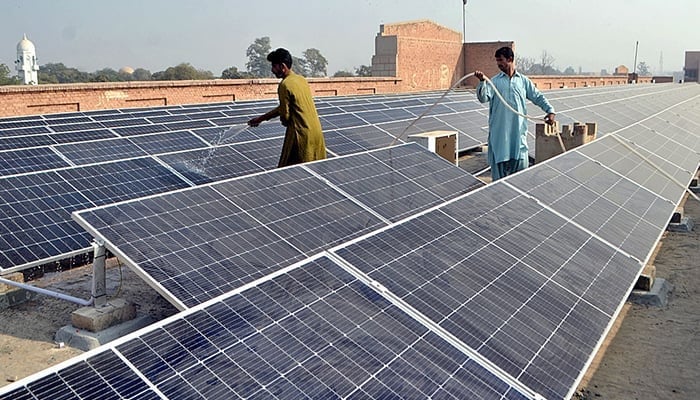Policy flip
LAHORE: Our bureaucrats are tuned to finding faults in policies that are chalked out after comprehensive deliberations. The trick is to point out the additional revenue potential if the policy is tinkered with.
Solar energy is a glaring example in this regard. Governments all over the world facilitate homeowners and commercial entities to install solar panels and produce clean electricity.
The Pakistani government has recently also offered many incentives in this regard. The duty on solar panels was withdrawn, and the government started buying additional power produced by residences and others by connecting the system with the grid. Homeowners could then consume the power transferred to the grid during the evening when solar power is not available. These facilitations encouraged a large number of middle-class households to go solar.
This practice accelerated as the power tariff was increased beyond imagination at the demand of the IMF. Solar energy is still a small source of power in the country. However, the problem that the power distribution companies face is that all honest consumers are shifting to solar power, while those thriving on theft are not bothered by high tariffs and continue to use grid electricity.
The bureaucrat, instead of suggesting ways to eliminate theft and corruption in the system, suggested that the government levy a capacity tax on solar panels.
The proposal was forwarded by the relevant ministry to the cabinet, which is reported to have approved it for solar plants over 12 kilowatts. The tax is Rs2,000 per kW per month. This is insane, as the consumers are generating power from their own resources; moreover, they installed these plants according to approved government policy. One thought that the rulers had learned their lesson and would not tinker with the announced policy.
In fact, the ruling elite has been assuring investors of the consistency of policies. The owners of small solar plants are small investors. When the government is not protecting smaller investors, how can the big investors trust it?
It is sad that bureaucrats lure rulers to make decisions on the assurance of generating revenues from any source where the consumer or the user cannot escape. Why do rulers not order the same bureaucracy to generate revenues from avenues that fall within their jurisdiction? Why are tax evaders with documented wealth spared? Why do they not ask the state to do away with exemptions? The bureaucracy should stop exploring easy ways of generating revenues. Soon, corruption will engulf solar plants as they will register lower capacities than installed to escape tax. Then the government will lower the limit of exemption from 12 kilowatts to 10, and then to 8, 6, 4, and so on.
As far as buying back extra power from the consumers is concerned, the policy was formulated in haste. There should have been a limit up to which the government would buy back, say, for instance, one-fourth of the installed capacity.
The state already buys the solar power at less than half its notified tariff. A further reduction in buy back is unjust.
-
 Caleb McLaughlin Shares His Resume For This Major Role
Caleb McLaughlin Shares His Resume For This Major Role -
 King Charles Carries With ‘dignity’ As Andrew Lets Down
King Charles Carries With ‘dignity’ As Andrew Lets Down -
 Brooklyn Beckham Covers Up More Tattoos Linked To His Family Amid Rift
Brooklyn Beckham Covers Up More Tattoos Linked To His Family Amid Rift -
 Shamed Andrew Agreed To ‘go Quietly’ If King Protects Daughters
Shamed Andrew Agreed To ‘go Quietly’ If King Protects Daughters -
 Candace Cameron Bure Says She’s Supporting Lori Loughlin After Separation From Mossimo Giannulli
Candace Cameron Bure Says She’s Supporting Lori Loughlin After Separation From Mossimo Giannulli -
 Princess Beatrice, Eugenie Are ‘not Innocent’ In Epstein Drama
Princess Beatrice, Eugenie Are ‘not Innocent’ In Epstein Drama -
 Reese Witherspoon Goes 'boss' Mode On 'Legally Blonde' Prequel
Reese Witherspoon Goes 'boss' Mode On 'Legally Blonde' Prequel -
 Chris Hemsworth And Elsa Pataky Open Up About Raising Their Three Children In Australia
Chris Hemsworth And Elsa Pataky Open Up About Raising Their Three Children In Australia -
 Record Set Straight On King Charles’ Reason For Financially Supporting Andrew And Not Harry
Record Set Straight On King Charles’ Reason For Financially Supporting Andrew And Not Harry -
 Michael Douglas Breaks Silence On Jack Nicholson's Constant Teasing
Michael Douglas Breaks Silence On Jack Nicholson's Constant Teasing -
 How Prince Edward Was ‘bullied’ By Brother Andrew Mountbatten Windsor
How Prince Edward Was ‘bullied’ By Brother Andrew Mountbatten Windsor -
 'Kryptonite' Singer Brad Arnold Loses Battle With Cancer
'Kryptonite' Singer Brad Arnold Loses Battle With Cancer -
 Gabourey Sidibe Gets Candid About Balancing Motherhood And Career
Gabourey Sidibe Gets Candid About Balancing Motherhood And Career -
 Katherine Schwarzenegger Shares Sweet Detail From Early Romance Days With Chris Pratt
Katherine Schwarzenegger Shares Sweet Detail From Early Romance Days With Chris Pratt -
 Jennifer Hudson Gets Candid About Kelly Clarkson Calling It Day From Her Show
Jennifer Hudson Gets Candid About Kelly Clarkson Calling It Day From Her Show -
 Princess Diana, Sarah Ferguson Intense Rivalry Laid Bare
Princess Diana, Sarah Ferguson Intense Rivalry Laid Bare




